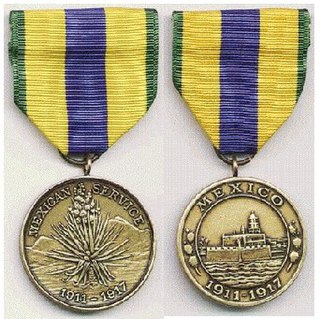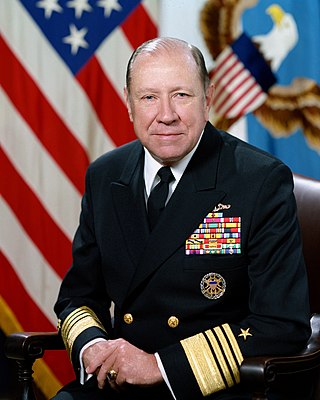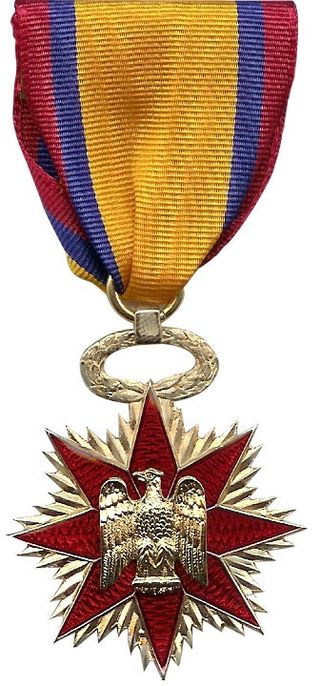Related Research Articles

The Distinguished Flying Cross (DFC) is a military decoration of the United States Armed Forces. The medal was established on July 2, 1926, and is awarded to those who, after April 6, 1917, have distinguished themselves by single acts of heroism or extraordinary achievement while participating in aerial flight. Both heroism and extraordinary achievement are entirely distinctive, involving operations that are not routine. The medal may be awarded to friendly foreign military members in ranks equivalent to the U.S. paygrade of O-6 and below in combat or support operations.

The Naval War College is the staff college and "Home of Thought" for the United States Navy at Naval Station Newport in Newport, Rhode Island. The NWC educates and develops leaders, supports defining the future Navy and associated roles and missions, supports combat readiness, and strengthens global maritime partnerships.

The Naval History and Heritage Command, formerly the Naval Historical Center, is an Echelon II command responsible for the preservation, analysis, and dissemination of U.S. naval history and heritage located at the historic Washington Navy Yard. The NHHC is composed of 42 facilities in 13 geographic locations including the Navy Department Library, 10 museums and 1 heritage center, USS Constitution repair facility and detachment, and historic ship ex-USS Nautilus.

The Gold Lifesaving Medal and Silver Lifesaving Medal are U.S. decorations issued by the United States Coast Guard. The awards were established by Act of Congress, 20 June 1874; later authorized by 14 U.S.C. § 500. These decorations are two of the oldest medals in the United States and were originally established at the Department of Treasury as Lifesaving Medals First and Second Class. The Department of the Treasury initially gave the award, but today the United States Coast Guard awards it through the Department of Homeland Security. They are not classified as military decorations, and may be awarded to any person.

The Mexican Service Medal was an award of the United States military for service in Mexico from 1911 to 1919.

William James Crowe Jr. was a United States Navy admiral and diplomat who served as the 11th chairman of the Joint Chiefs of Staff under Presidents Ronald Reagan and George H. W. Bush, and as the ambassador to the United Kingdom and Chair of the Intelligence Oversight Board under President Bill Clinton.

The Naval Academy Preparatory School or NAPS is the preparatory school for the United States Naval Academy (USNA). NAPS is located on Naval Station Newport, Rhode Island. The mission of the Naval Academy Preparatory School is "To enhance Midshipman Candidates' moral, mental, and physical foundations to prepare them for success at the United States Naval Academy".

The United States Naval Academy Cemetery and Columbarium is a cemetery at the United States Naval Academy in Annapolis, Maryland.
Commodore was an early title and later a rank in the United States Navy, United States Coast Guard and the Confederate States Navy, and also has been a rank in the United States Public Health Service Commissioned Corps and the National Oceanic and Atmospheric Administration Commissioned Officer Corps and its ancestor organizations. For over two centuries, the designation has been given varying levels of authority and formality.

The Naval Historical Foundation was a nonprofit organization founded in 1926 and disbanded in 2022. It had a broad mission to preserve and promote the naval history of the United States by supporting official maritime history programs and institutions, meeting the needs of the public for naval history, and collecting historical items. The foundation was located at the Washington Navy Yard in Washington, D.C.
Hispanics in the United States Naval Academy account for the largest minority group in the institution. According to the academy, the Class of 2009 includes 271 (22.2%) minority midshipmen. Out of these 271 midshipmen, 115 are of Hispanic heritage. In 2004, of the total of 736 female midshipmen, 74 (10%) of them were of Hispanic descent.

The Military Order of Foreign Wars of the United States (MOFW) is one of the oldest veterans' and hereditary associations in the nation with a membership that includes officers and their hereditary descendants from all of the Armed Services. Membership is composed of active duty, reserve and retired officers of the United States Armed Services, including the Coast Guard, National Guard, and allied officers, and their descendants, who have served during one of the wars in which the United States has or is engaged with a foreign power.
The Secretary of the Navy's Advisory Subcommittee on Naval History was formally established in 1956 and is the second oldest of the historical advisory committee's within the United States Department of Defense.
The Claud A. Jones Award is a prestigious award presented annually to the "Fleet Engineer of the Year" by the American Society of Naval Engineers (ASNE) since 1987. The award recognizes the efforts of United States fleet or field engineers who have made significant contributions to improving operational engineering or material readiness of the United States maritime forces during the past three years prior to nomination.
The Naval War College Distinguished Graduate leadership Award was established in 1996 by the Trustees of the Naval War College Foundation to honor United States Naval War College graduates who have attained positions of prominence in the field of national security.
The Naval Order of the United States was established in 1890 as a hereditary organization in the United States for members of the American sea services. Its primary mission is to encourage research and writing on naval and maritime subjects and preserve documents, portraits, and other records of prominent figures, deeds and memories of American naval and maritime history.
The Admiral of the Navy George Dewey Award is an annual award of the Naval Order of the United States to honor a U.S. citizen eligible for regular membership in the Naval Order, who has established a record of exemplary service that sets that individual apart from his or her peers.
The California Maritime Academy Corps of Cadets is the undergraduate student body at the California Maritime Academy. As a State Maritime Academy, as required by Title 46 Part 310 of the Code of Federal Regulations students are considered Cadets, required to wear uniforms, and utilize a demerit-based disciplinary system. Participation in the Corps of Cadets is mandatory; participation in the Navy Reserve Merchant Marine program is optional. Cadets still utilize Merchant Marine Navy-style uniforms, customs, and traditions. Based on academic majors cadets are organized into Squads, Sections, Divisions and Companies which regularly muster in Morning Formations multiple times a week, as well as stand watches on campus and aboard the training ship.
References
- ↑ John C. Rice, Jr., Naval Order of the United States: Past-Present-Future. (Paduchah, KY: Turner Publishing Company, 2003), p. 17.